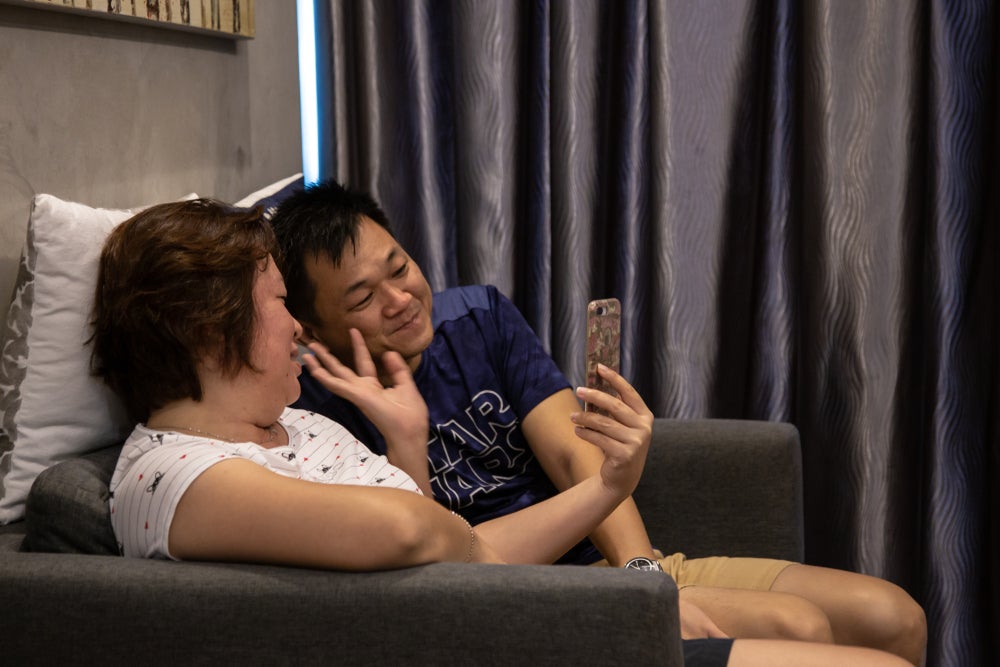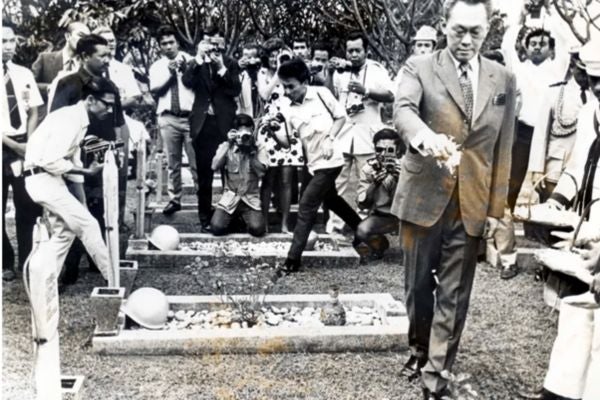The hard work of heart work: Malaysian transnational families and caregiving

https://doi.org/10.25542/574n-z357
In my last year of university, I decided to embark on a thesis project on Malaysian transnational families. This was also the year when the world began its ongoing battle against COVID-19. The border shutdowns that followed were unprecedented, and the large population of Malaysian migrants living and working in Singapore found themselves unable to cross the border between the two countries with the ease and frequency that they had previously enjoyed.
Border closures meant that family members were limited to virtual presence and interactions, indefinitely. As a Malaysian who had left home for education in Singapore, I was no stranger to the challenges of navigating and negotiating cross-border relationships. The work of kinship, of maintaining relationships at a distance, was hard work, and particularly so in a time of COVID-19 and the ensuing immobility.

At the height of the COVID-19 outbreak in Singapore and Malaysia, both Singaporean and Malaysian media brought to light the plight of Malaysian employees who were inevitably forced to choose between retaining employment or being with their family, and those who were separated from their children and wrestling with the heartache of separation. While these were mostly experiences of Malaysians from Johor who commuted via the causeway daily, other Malaysians residing in Singapore were also separated from their families indefinitely. This affected over a million Malaysians, with more than 300,000 Malaysians crossing the causeway daily and close to a million Malaysian migrants residing in Singapore.
My personal experiences as a Malaysian living in Singapore during the pandemic, as well as my interest in family and migration, spurred me to study Malaysian transnational families. In particular, I was interested in families with a young adult migrant studying or working in Singapore, while their middle-aged parents reside in Malaysia. Despite the prevalence of Malaysian young adults who move to Singapore for education or work opportunities, considerably limited research has been done on these Malaysian transnational families, especially young adults and their middle-aged parents. In my research, I asked two key questions: what does “care” work look like for families with young adult migrants and their healthy middle- or late middle-aged parents? How does gender shape the way such “care” is enacted?
For this research, I conducted 12 in-depth interviews with six parent-child dyads: single young adults aged 22 to 24, and their parents aged 50 to 59. The interviews took place over a seven-month period spanning 2020 to 2021, with interviews conducted either in-person or over Zoom for the young adults residing in Singapore, and exclusively over Zoom with Malaysian parents residing in West Malaysia. I recruited the young adults via personal networks and social media. They chose either of their parents (or had their parents choose between themselves) to participate in the study. The resulting sample was three mother-daughter pairs and three father-son pairs. All young adults who were recruited had resided in Singapore for a minimum period of two years at the point of recruitment.
Defining care and transnational kin-work
Studies on transnational families have explored the meaning and significance of care, and how our understanding of care has changed through the study of families whose members are separated by national borders. De Silva’s study on affluent, skilled, Sri Lankan migrants and their wealthy, older parents, suggests that caregiving takes on a different meaning for these older parents, where they expect care in the form of frequent communication with emotional engagement. Zechner’s study suggests “caring about” as a primary dimension of caring, which involves emotion and affection. Similarly, Finch highlights emotional and moral support as an important form of caregiving. These studies offer insight to alternative definitions of care work beyond the provision of economic resources and other practical forms of caregiving.
In my research, I chose to focus on di Leonardo’s concept of “kin-work” or the labour of maintaining family relations that “takes time, intention, and skill.” It involves the maintenance of kin ties through visits, letters and telephone calls, the organisation of gatherings, and the mental work of reflection about these activities. Researchers have explored kin-work among migrants and their families in a wide range of contexts. For example, Baldassar’s study of Italian migrants living in Australia and their ageing parents in Italy describes kin-work as labour that is primarily emotional, manifesting in emotions of “longing” and “missing”, which motivate them to construct co-presence with kin. Meanwhile, a study by Poeze and colleagues showed how Ghanaian migrant parent in the Netherlands do kin-work by long-distance communication through phone calls and sending gifts to their children’s kin or non-kin caregivers in Ghana.
So, what does kin-work look like among young adult children and healthy middle-aged parents who don’t need “care”?
Long-distance communication is the most common and convenient means of keeping in touch when family members are physically apart. Naturally, communication forms the primary means through which care is exchanged, as the parents of the young adult migrants in my sample were generally in good health and socio-economic circumstances, and thus did not require other common means of caregiving such as economic or practical support. This supports the argument that the age of left-behind parents creates different types of expectations, which is outlined in a similar study by Lam and colleagues on Malaysian transnational families spanning the Malaysia-Singapore border. As such, for these parents, there is a lesser expectation and burden on their children to provide regular and intensive care.
Caring through communication: A delicate balance of calling and withholding
For the Malaysian young adults and their parents in my sample, the primary way through which they kept in touch and cared for one another was through calling regularly. This gesture became even more important during COVID-19, as the young adults were not able to travel back home to visit their parents, as they normally would.
All six parents I interviewed wanted their children to call them more often. Unsurprisingly, they were also often the ones who initiated calls, where they would often share about each other’s daily lives, talk about family and relatives, school or work, and for some, express emotions of longing and missing. Mothers, especially, expressed more longing for frequent communication with their children.
Nancy, a 57-year-old mother of two daughters, expresses:
“I just hope that as they grow older, they will learn to have time for us also, because I know they are so busy with their schedule, but [I hope that] they would also think about the parents, what we need as we grow old, [and that] they will put some time to maybe come back and see us more… If they cannot come back, maybe [they] can give us a call, find out how we are.”
To Nancy, it was important that her daughters who were far away updated her and her husband regularly about their lives, called them to find out how they were, and made the effort to spend time with them. She took this as an indication that her children still cared for their parents even if they were far away and busy with their own lives.
However, the care and concern of parents for their children were evident not only in their efforts to regularly initiate calls with their children, but also, in the times when they did not call or text.
While they missed their children, some mothers chose to withhold the compulsion to call because they were afraid of being bothersome. This was the case of Kelly, a 54-year-old mother of two daughters.
“I don’t want them to feel stressed, like, ‘oh, my mum is calling’, or which day I have to call my mum… I want to text her more often, but I didn’t do that because I don’t want her to feel like, oh so disturbing or so annoying. So, I have to sacrifice, just hold back.”
Evidently, the emotions and “kin-work” did not always manifest in “doing” and actual “work”. Some mothers experienced having to withhold their emotions and desires to call or message their children more frequently, in fear of being bothersome to their busy young adult children. Kelly and Susan, both mothers of two daughters, desired to talk to their faraway daughter(s) more often, yet frequently chose to hold back calling them, in fear of being “disturbing” or “annoying”. This reflects the temporal emotion work of left-behind family members, as discussed in a study by Somaiah and Yeoh.
While the act of “withholding” may not result in tangible kin-work or outcomes, it still requires the regulation and negotiation of emotions, and can be a manifestation of care in the form of having a loved one’s best interest at heart.
Kin-work beyond “work”
Conversely, the Malaysian young adults I interviewed faced a different set of struggles, one of which was learning to balance “work” with “kin-work”.
The concept of kin-work is not as simple as viewing it as “work” and taking a methodical work-like approach towards the maintenance of relationships and practice of caregiving. Li Hui, a 23-year-old Malaysian who has been studying and working in Singapore for the past 10 years, recounts her difficulties of learning to communicate with her mother.
“I think my mum had some expectations that she didn’t say out loud. Her expectation was, call home often. But sometimes when I called her, she said, if you’re busy, don’t call, but she doesn’t mean it. But to me, I just take it literally. If I’m busy, don’t call. So, I didn’t call. Then she got angry. So, I told her, why don’t I set up an excel sheet, then I will indicate all my free time there, then you know when to call me, so it doesn’t have to be only me taking initiative. Then after that, she was just like, don’t want lah.”
Evidently, Li Hui’s mum was not receptive towards the idea of using work strategies of an excel spreadsheet and scheduling meetings in their relationship. While maintaining relationships does take actual work in terms of intention, time and effort, treating kin-work too much like work seems to lose the aspect of “care”, reducing it to just “work”. Kin-work involves the aspect of care, of which emotion and affection are necessary, if not primary.
As a result, Li Hui also experienced conflicting emotions of guilt for not fulfilling her mother’s expectation of her as a daughter and her own desire for independence and ambition. Through the years, Li Hui learnt to better communicate with and care for her mother in the way that her mother desires to be cared for. This was also the case for Leah, a 24-year-old Malaysian who has been working in Singapore for the past two years.
“I make it a point to at least drop her a message every day, because I can tell sometimes when I just go a few days without messaging her, she does get kind of worried, when I don’t reply her, so she just wants to know like, constant update of what’s going on, and stuff like that.”
Thus, it appears that these daughters were aware or learned to become aware, of the expectations and ideals their mothers had of them as daughters, thus compelling them to learn to better care for their parents in the way that they desired.
Closing thoughts
Caregiving and kin-work is complicated—it is, as di Leonardo puts it, labour that takes “time, intention, and skill”. It is a learned ability, where care is something that people have to learn to give and receive, and something that people are socialised into, which shapes the way they expect and receive care, thereby differing across gender, cultures, and generations.
My research explored parent-child relationships at a specific juncture of life – when children are single young adults and parents are in their middle-age years, approaching senior years. In some ways, this served as a preview of the parent-child relationship in the future, as well as the potential caregiving issues that might arise as parents get older and increasingly require physical care. Currently, there is a wide literature on caregiving for elderly and ageing parents, but we know little about the family dynamics before this period in the family’s history. I believe that studying young adult relationships with middle-aged parents will be important for understanding relationships and how caregiving is performed in the future.
The views expressed in this forum are those of the individual authors and do not represent the views of the Asia Research Institute, National University of Singapore, or the institutions to which the authors are attached.









